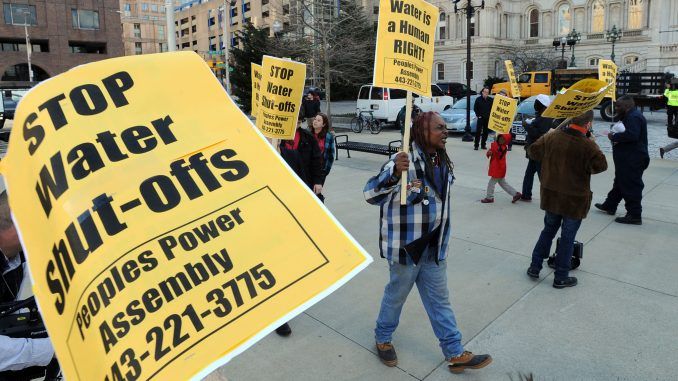
First it happened in Detroit, now it looks like the same thing is about to happen in Baltimore. Starting in two days with very little notice given and no public hearings, 25,000 households in Baltimore are at risk of losing their access to water if they have bills of $250 or more outstanding.
ThinkProgress reports: Rita, a renter in Southeast Baltimore who asked to remain anonymous for this story in order to protect her two children from being taken away, told ThinkProgress she was served with a shutoff notice last week. Maryland law states that a child that is “neglected” may be taken out of his or her home and put into foster care. One characteristic of “neglect” as defined by the Maryland Department of Human Resources is a child with “consistently poor hygiene” that is “un-bathed, [having] unwashed or matted hair, noticeable body odor.”

BYPASS THE CENSORS
Sign up to get unfiltered news delivered straight to your inbox.
You can unsubscribe any time. By subscribing you agree to our Terms of Use
“I love my kids, and I’d do anything for them,” Rita told ThinkProgress. “But if I turn on the shower or the sink and there’s no water, how can I give them a bath?”
Food and Water Watch researcher Mary Grant explained that making water unavailable to residents is a major health risk, and that if Baltimore were to deprive 25,000 households of water, diseases would have a high chance of propagating throughout densely-populated neighborhoods.
“There is direct risk associated with lack of access to water,” Grant told ThinkProgress. “When you lose your water service, you lose water to wash your hands to flush the toilet, there is risk of disease spreading.”
City officials like Department of Public Works director Rudy Chow claim that residents using water without paying are to blame for the $40 million in overdue water bills. In fact, the Baltimore Sun found more than a third of the unpaid bills stem from just 369 businesses, who owe $15 million in revenue, while government offices and nonprofits have outstanding water bills to the tune of $10 million. One of those businesses, RG Steel (now bankrupt) owes $7 million in delinquent water bills all by itself.
“It’s interesting that the city isn’t targeting those businesses first,” Grant said.
According to Grant, Baltimore has steadily increased water usage rates over the past three years by a total of 42 percent, once another 11 percent rate increase takes effect this July. The Baltimore Sun reported that the public works department elected to raise the rates in 2013, when 19,500 customers owed $29.5 million. While the city has pointed out that there are payment plans available for residents behind on water bills, Grant said the help is far too small to make any real difference for overdue households.
“There is low-income assistance, but it’s only a one-time payment of $161,” Grant said.
Approximately half of Baltimore’s 1.8 million residents rent their homes, and many are counting on property owners to promptly pay water bills. Even if a landlord is not making payments, Baltimore’s water department refuses to open new water accounts for anyone who isn’t a property owner. Jessica Lewis, co-founder of the Housing Rights Alliance, said landlords shifting water payment responsibilities to tenants is a “growing problem.”
“We have weekly tenants’ meetings here, and there’s never a meeting where someone isn’t talking about how high the water bills are,” Lewis said. “Tenants have a hard time challenging water bills when these burdens are shifted from the landlord to the tenant.”
Last year in Detroit, residents fought back against a similar plan to shut off water to customers with overdue bills. At one point, the United Nations stepped in and condemned the city’s water shutoff plan, taking the side of residents unable to pay increasingly high water bills.
“Disconnection of water services because of failure to pay due to lack of means constitutes a violation of the human right to water and other international human rights,” the statement read.
Catarina de Albuquerque, a UN expert on the human right to water and sanitation, directly addressed the argument that Detroit Water and Sewerage Department officials proposed that residents who have the means but don’t pay deserve to lose their access to water.
Niamh Harris
Latest posts by Niamh Harris (see all)
- Zelensky Pleads With The West To Treat Ukraine Like Israel - April 16, 2024
- New Law Will Allow Germans Over 14 To change Their Gender Once A Year - April 16, 2024
- French President Emmanuel Macron Calls For ‘Isolation’ Of Iran - April 15, 2024


Be the first to comment